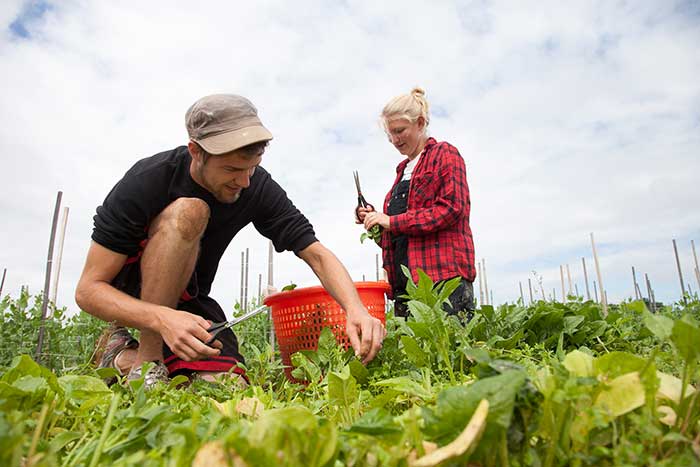Rugged, Rigorous and Rewarding

Kristiana Amberger '14 will soon fill that basket with fresh-picked produce that might be sent to the Dickinson kitchens, to Project S.H.A.R.E. or to the Farmers on the Square market, or to the homes of Dickinson's community-shared agriculture (CSA) subscribers. Or it may help feed hungry farm managers, interns and student-workers. Photo by Carl Socolow '77.
College Farm internship yields delicious rewards
by MaryAlice Bitts-Jackson, videos by Joe O'Neill, photos by Carl Socolow '77
On graduation day, members of the class of 2014 emerged from the John Dickinson Campus to begin new adventures—some within the tri-state region, others across the country or around the world. But for four new grads with planned careers in the fast-growing fields of sustainable agriculture and environmental science, the ideal opportunity was just a short bicycle ride away.
Kristiana Amberger (environmental studies) and environmental-science majors Emily Bowie, Kyle Long and Brendan Murtha are serving intensive, six-month internships at the College Farm. And it's not for the faint of heart: Farm interns live in solar-powered yurts on farm grounds throughout the growing season (May through October) and typically work outdoors for eight hours each weekday, often in the hot afternoon sun. Each is responsible for a specific farm operation but also learns about all different aspects of sustainable-agriculture production, such as metalwork, machinery operation, vegetable growing, crop and rotation planning and worker management.
Along the way, they acquire skills that reach far beyond the agricultural sphere.
Long and Bowie run the farm’s rotational grazing system and tend to the animals. They begin and end each day tending to the livestock and chickens—opening the chicken house, ensuring that the cows and sheep are pastured and have access to fresh water and even bottle-feeding newborn lambs (see above video).
“The sheep have wonderful personalities that make the work more than worth it,” says Bowie, who researched a sheep parasite, Haemonchus contortus, during her senior year.
Amberger runs the farm’s produce stand at a local weekly market, Farmers on the Square. She enjoys educating customers about the sustainable-agriculture systems behind the food she sells. “I explain to them that we’re not just farming; we’re creating an ecosystem,” she says. “It involves everything—growing flowers for the pollinators, creating ponds for the frogs and bird boxes for the blue birds and more.”
Murtha manages the farm’s irrigation and composting systems (“I sometimes find myself working overtime, because I like to see a project from beginning to end,” he says) and also enjoys working with farm machinery. He helped convert one of the farm’s small tractors from gas to electric during his junior year, and he recently restored and modernized a 1950s-era cultivation tractor that will aid with weeding duties.

In the afternoons, the interns gather together in the field, along with the farm's current student workers, to plant, sow, weed and harvest.
"Working outdoors can get very tiring, but it's the most rewarding part for me,” says Long, who appreciates the bonding that unfolds during long days in the field. "It's also nice to eat food I've helped produce," he adds, noting that, like his fellow interns, his passion for sustainably produced food has inspired him to make significant dietary changes. Whereas he once thought nothing of devouring a sleeve of Oreos in one sitting, he now eats more fresh produce and fewer processed foods.
Murtha, who worked at a Massachusetts farm before signing up to volunteer at the College Farm during his first year at Dickinson, says that he never considered a farm career. Now, he's confident that he'll be well-prepared to manage his own farm someday.
“Because it’s small and diversified, the farm offers opportunities that production-oriented farms do not have the time or budget for, such as how to identify common edible weeds and the impacts of biodiesel on the fuel system of a tractor,” says Murtha, who conducted research during his senior year on the effects of an invasive insect on trees surrounding Carlisle.
Management skills are rotated into the mix. Each intern must ensure that the student workers under their watch are well-trained, hydrated and efficient and that they remain motivated, even while weeding in the hot summer sun—a formidable challenge for any new manager and a valuable skill for any future leader to hone.
The personal rewards are far-reaching as well. Bowie reports that the purposeful, meditative nature of field work has made her “a calmer, happier person,” and the physical demands have boosted her resilience in profound ways. Added to what she’s learned in the classroom and through her experiences as a Baird Sustainability Fellow, Idea Fund coordinator and study-abroad student in Tanzania, that grounded sense of accomplishment can lead to great things.
“The physical challenge is the best and worst part [of working at the farm], because it gives me confidence in my physical abilities,” she explains. “I’ve pushed my body to its limits, only to find out they aren’t actually limits.”
Learn more
- College Farm
- Sustainability at Dickinson
- Life Beyond the Limestone
- “Cultivating More Than Crops”
- “For Students, By Students” (Emily Bowie ’14)
- “Why I Chose Dickinson” (Brendan Murtha ’14)
- Latest News
Published July 8, 2014
